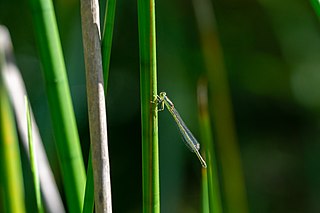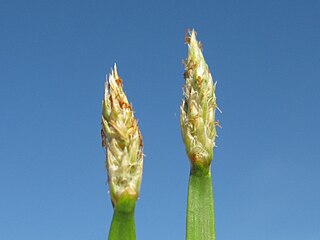
Eleocharis is a virtually cosmopolitan genus of 250 or more species of flowering plants in the sedge family, Cyperaceae. The name is derived from the Greek words ἕλειος (heleios), meaning "marsh dweller," and χάρις (charis), meaning "grace." Members of the genus are known commonly as spikerushes or spikesedges. The genus has a geographically cosmopolitan distribution, with centers of diversity in the Amazon Rainforest and adjacent eastern slopes of the South American Andes, northern Australia, eastern North America, California, Southern Africa, and subtropical Asia. The vast majority of Eleocharis species grow in aquatic or mesic habitats from sea level to higher than 5,000 meters in elevation.

Lake Batyo Catyo is a man-made freshwater lake located 26 km west of the town of St Arnaud in North Central Victoria, Australia.

Eleocharis quinqueflora is a species of spikesedge known by the common names fewflower spikerush and few-flowered spike-rush. It is widespread across Europe, North Africa, northern Asia, and North America. There are also isolated populations in Argentina and Chile.
Eleocharis acuta, commonly known as common spikerush or small spikerush, is a sedge of the family Cyperaceae that is native to Australia.
Eleocharis brassii is a sedge of the family Cyperaceae that is native to Australia.
Eleocharis caespitosissima is a sedge of the family Cyperaceae that is native to Australia.
Eleocharis jacobsiana is a sedge of the family Cyperaceae that is native to Western Australia.
Eleocharis keigheryi is a sedge of the family Cyperaceae that is native to Australia.

Eleocharis ochrostachys, commonly known as spike rush, is a sedge of the family Cyperaceae that is native to Australia and Asia.
Eleocharis papillosa is a sedge of the family Cyperaceae that is native to Australia.
Eleocharis philippinensis is a sedge of the family Cyperaceae that is native to Australia.
Eleocharis pusilla is a sedge of the family Cyperaceae that is native to Australia.
Eleocharis rivalis is a sedge of the family Cyperaceae that is native to the Kimberley region of Western Australia.
Eleocharis sanguinolenta is a sedge of the family Cyperaceae that is native to the Kimberley region of Western Australia.

Eleocharis sphacelata, commonly known as tall spikerush, is a sedge of the family Cyperaceae that is native to Australia and New Zealand.
Eleocharis spiralis is a sedge of the family Cyperaceae that is native to Australia.
Eleocharis sundaica is a sedge of the family Cyperaceae that is native to Australia.
Eleocharis triquetra is a sedge of the family Cyperaceae that is native to the Kimberley region of Western Australia.

Eleocharis plana, the flat spike-sedge, is a flat perennial sedge with creeping rhizomes, which grows up to 80 cm high in moist situations. It is widespread in inland New South Wales, and is also found in Queensland and in South Australia.





